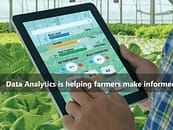As of 2021, India will be using e-commerce, digitally-powered logistics, and advanced AgriTech farming as crucial factors to boost the growth of the agricultural sector to $35 billion market share by 2025. This is owing to important regulatory and technology changes, for example, the Agricultural Produce Marketing Committee (APMC) tax waiver of 2020 that allows farmers to sell directly to corporations. There are also many new business opportunities arising from the government’s decision in 2020 to allow the movement of food items from production to consumption centers freely and allow private investment in storage as well.
So let’s take a look at how digital engagement is possible with the AgriTech sector in this new era.
E-Governance
The term Industry 4.0 originated in Germany where it was applied to rapid transformations in the design, manufacture, operation, and service of manufacturing systems and products through digital technology. This ‘Fourth Industrial Revolution’ has brought sweeping changes to the food and agriculture sectors, such as the spread of mobile technologies, remote-sensing services, and distributed computing. This is improving many small farmers’ access to information, inputs, market, finance, and training.
So this digital revolution in agriculture can greatly decrease the digital divide between other sectors and agriculture since it is geared to uplift those at the bottom of the food chain. To take advantage of the benefits of digital technologies in agriculture, farmers, scientific researchers, the private sector, non-profit organizations, and government branches must work in tandem to create a digital agriculture ecosystem.
The key points of engagement are:
1. Government policies and programs should effectively facilitate the adoption of digital technologies by the agriculture and food sector.
This can only be done by policymakers who will undertake a cost-benefit analysis and intervene with an ‘Agritech’ solution in areas where there is a market failure and/or a public interest benefit.
2. Government can make use of digital technologies to implement better agricultural policies.
This is achievable by government departments who thoroughly research and apply the relevant technology at different points of the policy cycle. This would require government officials to expand their skill-sets, invest in technology and training, and partner with other government departments in collaboration with the private sector.
3. Government can create and harness the power of digital infrastructure to enhance the power of intervention wherever needed.
This is particularly relevant to the agricultural sector in India, a largely agri-centric country. However, it is potentially applicable to every sector going forward. One thing to keep an eye on is, a precautionary set of regulations to deal with digital rights issues, including privacy, interoperability, and even potential liability lawsuits.
E-Commerce
Moving on to the private sector’s opportunity to digitally engage with the AgriTech industry, we can see that there is immense growth potential and thus for investment in this sector. According to a report by Bain & Company titled, ‘Indian Agriculture: Ripe For Disruption,’ authored by Parijat Jain, Prashant Sarin, and Shalabh Singawne, ‘Digital Disruptions’ is key to building a robust AgriTech sector. Insurance, credit rating, and loans are contributing to increased funding for this sector. In farming activities, weather prediction and smart crop management are leading to higher output while sensors and the Internet of Things are enabling better tracking and visibility of farming activities.
Direct sourcing, demand forecasting, and inventory management are fuelling agricultural produce sales. “Digital engagement is promoting the ‘uberisation’ of services, creating online communities and marketplaces and even driving e-commerce,” the report said. So digital engagement through online communities and marketplaces will drive e-commerce, letting farmers integrate most effectively and productively into a digitally-enabled agricultural delivery system.
Digital Marketing In AgriTech
Social networking, knowledge discussions, and knowledge-sharing on online platforms have opened up a lot of opportunities for Indian farmers in the 21st century.
A study by Meredith Agrimedia in 2015 and a Farm Futures survey in 2016 found that Facebook is the most popular social media platform used by farmers, followed by YouTube, Twitter, Linked In, Pinterest and Instagram.
The digital divide between rural or urban communities, or between younger and older generations, is also closing quite rapidly. It’s a powerful means of expression and engagement. It also means greater inter connectivity, and it creates sales growth through popular media outreach.
Exposure to new and better farming practices automatically results into higher levels of productivity. Exposure to social media, e-commerce and digital marketing will then transform that productivity into an upward sales boost. This ensures that the people who are most integral to the well-being of the country, meaning the farmers who produce the food that sustains us, do not get left behind as the rest of the population moves into the future. Food security is arguably the most important factor to protect the strength of an independent nation, and for this, we depend on our farmers!
So in conclusion, we have gone over how the public sector, the private sector, and digital marketing can impact farmers who use AgriTech sustainably and profitably. Looking forward to 2025, we can make a serious effort to influence the sustainable and inclusive uptake of digital technologies. AgriTech is already working in the aftermath of the Covid-19 pandemic to enhance traceability technologies that can improve agricultural value chain transparency, enhance food safety and combat fraud; and potentially enable new environmental protection policies to promote sustainability. The role of digital marketing then becomes, to accurately and encouragingly facilitate the sharing of new AgriTech solutions on the market and spread the information among farmers and buyers.
To find out more about how Focus Agritech is helping farmers access digital technology for their sales and output needs, visit our website today!







